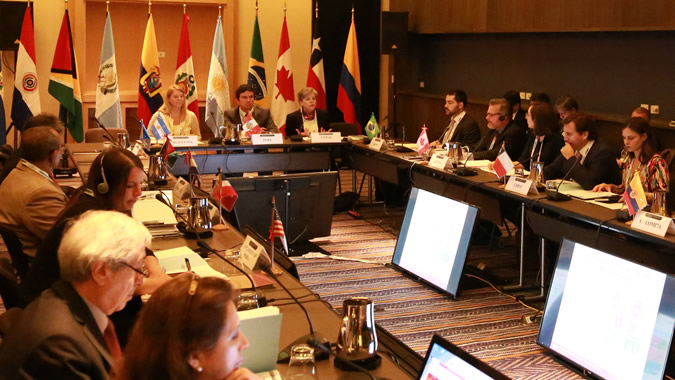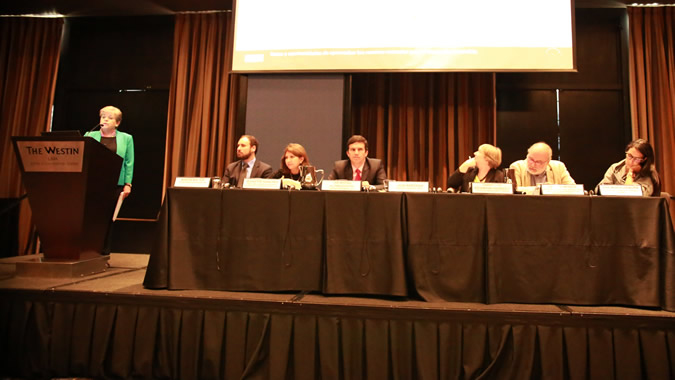Mining Ministries of the Americas Meet in Peru to Address the Sector’s Challenges and Opportunities with regard to Sustainable Development
Work area(s)
ECLAC’s Executive Secretary, Alicia Bárcena, was one of the main speakers at the IX Annual CAMMA Conference, which was held in Lima.

At the IX Annual Mines Ministries of the Americas Conference (CAMMA) held this Tuesday, November 20, in Lima, Peru, sector authorities from various Latin American and Caribbean countries addressed mining opportunities and challenges for achieving more sustainable development in the region. ECLAC’s Executive Secretary, Alicia Bárcena, was one of the main speakers, and she gave a presentation on the state of mining in which she stressed the need to promote mining governance to contribute to countries’ sustainability.
The gathering – which was attended by ministers, deputy ministers and other high-level representatives from 12 countries: Argentina, Brazil, Canada, Chile, Colombia, the Dominican Republic, Ecuador, Guatemala, Honduras, Paraguay, Peru and the United States – was inaugurated by Luis Miguel Incháustegui, Peru’s Deputy Minister of Mining, who welcomed participants. He was joined by Carolina Sánchez, Argentina’s Mining Policy Secretary and President of the Executive Committee of the Mines Ministries of the Americas Conference (CAMMA) and Alicia Bárcena, Executive Secretary of the Economic Commission for Latin America and the Caribbean (ECLAC).
The conference’s main presentation was made by Alicia Bárcena, who gave an overview of the regional mining sector and its challenges in the current global context, characterized by slow economic growth, a weakening of multilateralism and increased protectionism, technological and trade-related tensions between the United States and China, an accelerated technological revolution and uncertain labor future, the threat of climate change which requires a change in the energy paradigm, and a demographic transition reflected in heavy migratory flows.
“We are at a turning point in the advance of globalization. The next decade of mining will be driven by digital and sustainable business models. Latin America and the Caribbean must prepare itself for this challenge, which is already upon us,” indicated ECLAC’s Executive Secretary, who was accompanied by Mario Cimoli, the Commission’s Deputy Executive Secretary, and Jeannette Sánchez, Chief of the Natural Resources and Infrastructure Division of the United Nations regional organization.
Bárcena indicated that the region has a relevant share of the global reserves of the main metallic minerals, especially gold, lead, nickel, silver and zinc, but in recent years it has lost ground with regard to copper, lithium, iron-ore, tin, bauxite and alumina. In addition, it has specialized in exporting mining commodities, the weight of which has nearly doubled in the last 20 years (going from 20% in 1995-1997 to 37% in 2015-2017). This is four times bigger than the weight that global mining exports have (9% in 2015-2017).
She added that the “supercycle” in commodities prices (seen between 2002 and 2008) improved the terms of trade and invigorated the region’s exports, but this boom was manifested in a heterogeneous and volatile way in the prices of the main minerals, which provoked substantial fluctuations in fiscal revenue, complicating taxation by the producing countries. This, in turn, affected investment: between 2003 and 2017, $171 billion dollars’ worth of Foreign Direct Investment (FDI) went into mining in the region, and a decline was seen in the last five-year period, Bárcena said. However, FDI announcements indicate that investments will resume growth in 2018, fueled by copper mining in Chile and Peru.
On another note, ECLAC’s most senior authority indicated that significant environmental challenges remain for mining in the region, such as pollution, water use and the destruction of habitats, among others, in addition to the fact that Latin America and the Caribbean is the region with the most socio-environmental conflicts related to mining exploitation.
“In this scenario, having a governance of natural resources is essential. This governance requires a long-term vision that allows for institutional innovation to maximize social benefits in the present and in the future,” Bárcena stated.
She added that for sustainable management of mining resources, an effective governance must be democratic, meaning that it allows for strengthening national and local institutional capacities and promotes dialogue and multi-stakeholder participation that is informed and transparent. In addition, it must drive progressive structural change, with fiscal mechanisms for stabilization, savings and investment that are suited to the specificities of each country; it must also improve the relationship of mining with its environmental and social surroundings to prevent socio-environmental conflicts (here the Escazú Agreement recently signed by 16 countries of the region is an example to follow), and promote regional integration, with regional value chains to increase resilience in the face of external tensions.
Related content
Estado de situación de la minería en América Latina y el Caribe: desafíos y oportunidades para un desarrollo más sostenible
Presentación de Alicia Bárcena, Secretaria Ejecutiva de la CEPAL, en la IX Conferencia Anual de Ministerios de Minería de las Américas CAMMA (Lima, Perú, 20 de noviembre de 2018).

Authorities and Experts from Various Latin American and Caribbean Countries Stress Importance of Mining Governance to Contribute to the Sustainability of Development and an Environmental Big Push
ECLAC’s Executive Secretary, Alicia Bárcena, gave a presentation at a high-level seminar on mining opportunities and challenges in the region, which was held in the framework of the cooperation…
Country(ies)
- Latin America and the Caribbean
Contact
Public Information Unit
- prensa@cepal.org
- (56 2) 2210 2040